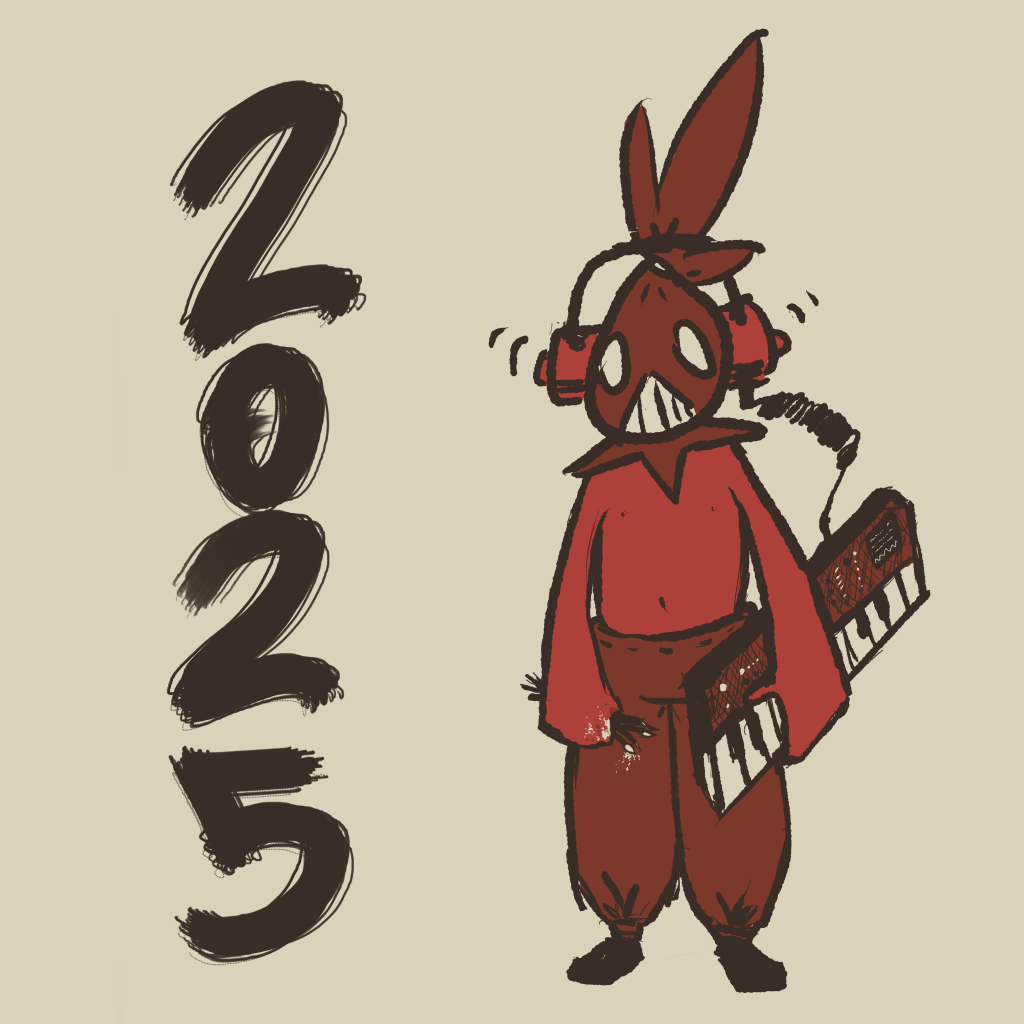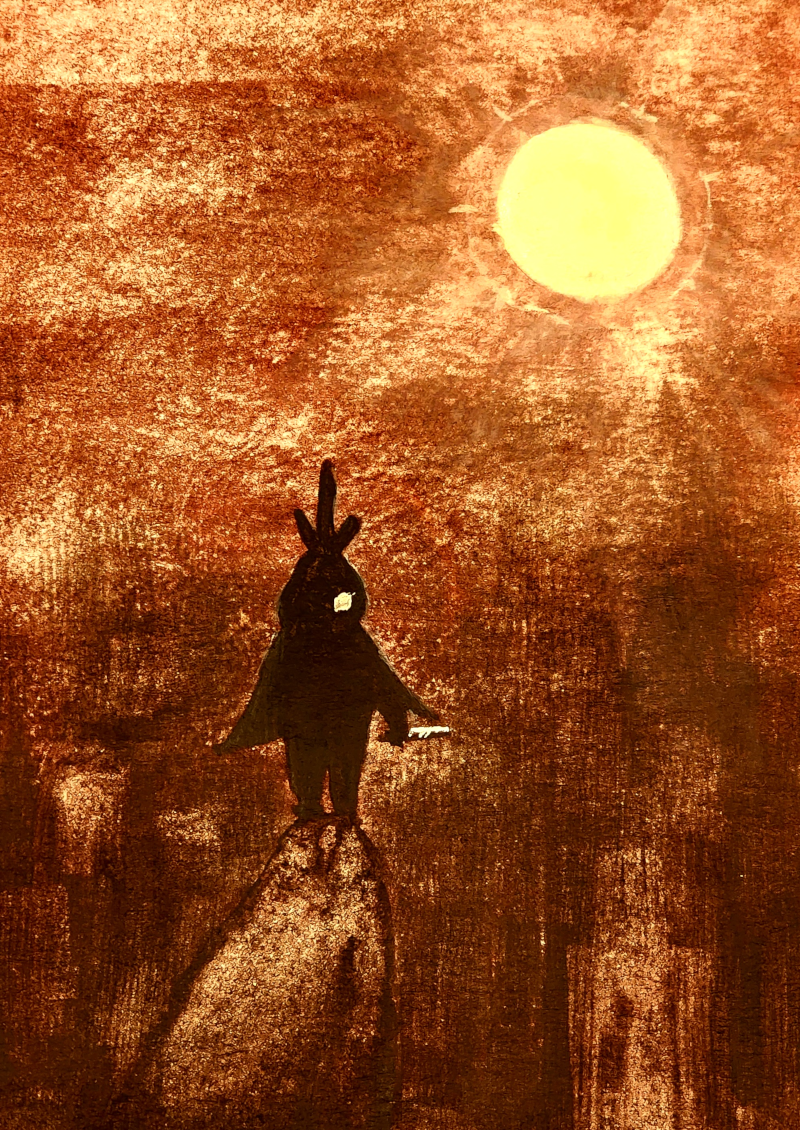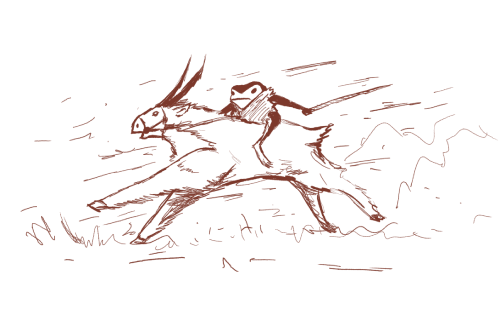Thoughts: Music Update Jan 2026 - DAWless
After an exciting start in 2024, my musical growth stagnated a little over the course of 2025. While my interest-in and joy-derived-from making music has gone unhindered, I haven't produced very much of late (save for my June 0dd.company project: Whalefall)
Outside of that, however, I have still done a lot of tinkering! I've played with the headless version of the Dirtywave M8, learned (and subsequently forgotten) how to use LSDJ and Nanoloop on the GBA/Analogue Pocket, had a bunch of fun with Bespoke Synth, and spent many evenings failing to read sheet music or jamming along to a song on a bongo or with my Arturia Microfreak.
There was much music, but I never felt like producing a song, as I felt very much turned off by DAWs. Don't get me wrong, my DAW of choice (Bitwig) is an excellent piece of software -- just the whole concept of involving my computer in the process felt wrong outside of standalone midi controllers and synths like Orca and Bespoke. I hated the entire VST situation from the get-go, I didn't want to play stupid games with Wine to get a virtual piano working, and honestly there was just too much going on. I think a DAW is objectively the best and most powerful way to produce a song, but it doesn't spark joy. It doesn't feel like music to me.
- Read the rest -
Year End: 2025
2025 was a stressful year.
The world, which has been inching closer to insanity for a good portion of my adult life, now seems to be moving in full strides. News and social media have pushed beyond satire into absurdism, the cyberpunk dystopia presented in books like Snow Crash has effectively been realized in the modern age of AI and literal "Megacorps", and quite honestly I don't see a way to dial it all back or divert the course of where humanity seems to be headed.
It has also been a stressful year at work. I have spent my career (~13 years now) doing web development and general problem-solving at a public university. It's a job I love, but due to some budget changes and restructuring I felt it was necessary to push a bit, which resulted in a daunting new job title, a new boss, and new team members. The transition, added responsibility, and visibility into the inner workings of the beast have left me somewhat breathless and exhausted. The requirements of the new role are often at odds with my natural un-seriousness and "open & free" philosophy, and as someone who tends towards workaholism, I worry that this new role will slowly erode a critical part of me.
Media-wise 2025 was an interesting shift. I played less games, read less books, and watched less shows, but the media I did consume felt impactful and important toward the end of the year. Reading Borges' Collected Fictions took a large chunk of time and resulted in a big mental shift for me, leading me to seek out more short-story-shaped content and literature instead of the beefy fantasy and scifi novels I'm accustomed to. I think this shift was already starting to happen, but I feel like I'm better positioned to pick out things that will keep me interested going forward (we shall see).
Normally I'd list out every book and game here, but I've added an archive page to the site for much easier access! My book and game of this year are easily Borges Collected Fictions and Expedition 33.
Output-wise 2025 has been excellent. In March I founded 0dd.company, a small amateur artist collective designed to match my own slow pace of production. We have 3 small galleries now, and I've been able to consistently work on bite-sized content in-between the larger 3-month project timelines. These projects aren't anything crazy like the game-dev and book-writing plans I slowly accumulate (and never make) in my head, but by focusing on smaller creative endeavors I'm getting more practice and actually making things instead of just thinking about them. Between my mastodon account, the 0dd.company, and this blog I'm happy with what I've put out this year.
I want 2026 to be a year of learning, making, and philosophy. I need to stay centered and not let work bleed into my personal time, and I want to wield that personal time effectively to learn and make interesting new things. I also need to not let the world going to shit get to me -- the world has always been going to shit, and it will continue to do so whether or not I stress out about it.
May 2026 see many curious new ideas and no major catastrophes.
Story: Swept Away
I've been writing a few short stories for the #0ddPrompt inspirations that get posted weekly on 0dd.company, and this week's is "Caught in a shallow stream." I immediately thought of something this time, and wanted to get it down before I forgot.
- Read the rest -
Game Thoughts: Final Fantasy Tactics (Ivalice Chronicles)
With a fresh re-release of what I've long considered a favourite game, I found myself with an opportunity to revisit Final Fantasy Tactics via the Ivalice Chronicles Edition. The original title for the PS1 did something in my brain long ago which fooled me into thinking myself a die-hard fan of tactical RPGs for nearly my entire life. Equipped with recent memories of a wonderful time with Final Fantasy Tactics: A2, and a much worse recent experience with Tactics Ogre, I was interested to finally pinpoint exactly what it is about this particular series that tickles my brain so.
The game holds up extremely well, and held my attention firmly throughout. The remaster comes equipped with several quality of life improvements that reduce the sense of grind, but the overall experience feels true to form.
As that experience unfolded I began to discard my notions of what I thought made the game great. The story, especially once the zodiac stones come into play, was tepid. The music, while lovely, was repetitive. The tactical RPG combat, while formative to the genre, was frequently not really that engaging.
It turns out I just really love a goddamn job system.
At the end of the day the B-grade music and C-grade combat were simply seasoning for the main event: the job system and those god-damned cute sprites and character portraits. I can't even called what I did fun -- grinding out repetitive battles, forcing my characters to throw rocks at each other; none of it was fun, I was simply obsessed.
Seeing the sprites and character art of a new class (that black mage is to die for), trying out the new abilities, optimizing combinations of skills and armour and stats -- I couldn't get enough of it! I could have taken or left the rest of the game, there just needed to be some form of intentional task required to unlock new things. I marched my army across continents for in-game years to breed monsters for specific weapons, grinded endlessly for overpriced skills, developed the teams needed to pick apart certain battles and challenges with ease.
More than tinkering with the system, I revelled in breaking it. Building characters that entirely trivialized the gameplay brought me such joy, re-confirming that I was never here for the turn-based strategy. I cackled with glee as my carefully optimized arithmetician cast "Holy" on every character on the map, wiping out friend and foe alike but leaving a single soul in anti-holy armour left to claim victory. I would effortlessly eliminate a boss in a single bound as my ninja-dragoon flew across the map and exclaim to my partner how thrilled I was (they did not share my enthusiasm about dragoons.)
The playthrough re-enforced my love for this series, and while I was slightly disappointed that it wasn't the deep story and engaging grid-based combat I was in love with all ths time -- rather it was menu-diving and counting how many points left until I unlocked the "Teleport" ability -- I also feel freed, for I know now why so many exciting tactical RPG titles disappointed me for so long.
Book Thoughts: A Night in the Lonesome October
While I was not a fan of Roger Zelazny's Amber series, my distant memories of "Lord of Light" have kept me nudging me to explore his other works.
Of all the praise that's heaped on his various writings, A Night in the Lonesome October caught my eye the most -- I was particularly drawn to the book's design which is intended to be read one chapter per day in the month of October. Having recently purchased a small bed-side desk to pick up bed-time reading, this seemed the perfect way to ease myself back into the habit.
I very much enjoyed the book! It's a bit campy and silly, but a lot of good fun. It follows Snuff (a dog) and several other animal familiars preparing for a mystical "game" of sorts that their masters will undertake over the course of October. These masters take the forms of many classic Halloween characters ranging from Dracula to Frankenstein to Jack the Ripper -- but it's done in such a way that I didn't even realize this until several chapters in (though admittedly this may have been my own dense-ness rather than intentional cleverness on the writer's part).
While there wasn't much to the story that was particularly novel besides the one-chapter-per-night structure, it was well-written enough to keep me excited for my nightly chapter, and I was very attached to the main cast by the end.
I'm not sure if it was good enough to make it worth a yearly reading like many comments about the book suggest, but it was good fun and most definitely kept me in the October spirit throughout the month.
Comic Thoughts: Tongues (vol 1)
After last week's successful comic haul I found myself hungry for more and returned to the comic shop to rid myself of all my funds. This time I discovered several lovely art books, a copy of the Codex Seraphinianus, and a very well-received graphic novel: Tongues (vol 1) by Anders Nilson.
Tongues follows several characters and leaps back and forth in time, centering around ancient greek mythical figures (primarily Prometheus and Jupiter).
The story and artwork drew me in instantly, and before I knew it I had spent the better part of a day curled up, pouring over the simple-yet-intricate line work and unique panel layouts covering each page.
I enjoyed Nilson's visual and philosophical takes on these gods, their relationships with humanity, and the importance of language. I also thoroughly enjoyed nearly every scene featuring Nilson's Prometheus.
I will admit that I'm not entirely clear what happened at the end of the comic (there were some strange dreamlike scenes with some characters), but I eagerly await volume 2 to see what happens next.
Comic Thoughts: October Haul - Stages of Rot, A Frog in the Fall, Shuna's Journey
I happened into a comic shop yesterday, and allowed serendipity to lead me to some new reading. A stand near the front of the shop sported a visually stunning book, Stages of Rot by Linnea Sterte, and nearby an equally attractive butterfly-bound vibrant green book called A Frog in the Fall (And Later On) by the same author. While I didn't initially intend on purchasing multiple comics by a single author, flipping through both revealed a wonderfully distinct pair of works.
Stages of Rot was a lush visual spectacle, sporting colour-coded chapters grouped by the phases of a giant mythical sky whale rotting -- a play on the very real biological phenomenon of a "whalefall". While sparse on coherent story and fairly short, I enjoyed every page of this bio-mystical feast.
A Frog in Fall on the other hand is a much more humble, almost childlike story of a young frog traveling with some vagrant toads seeking a path to "The Tropics," where they will be free from the winter. The book is in monotone, simple drawings that elicit calmness. The trio meet many creatures from mice to dogs to persimmon nymphs. It is a relaxing twist on a cautionary tale -- nothing bad actually happens to the frog despite his lack of caution, and while the world around him is filled with the natural death that accompanies winter, it all feels peaceful rather than ominous.
While perusing the shop I also accidentally stumbled into the Ghibli section, which was filled with various art books and tie-ins. Shuna's Journey caught my eye -- a manga by Hayao Miyazaki himself which sports the famous elk from Princess Mononoke on the cover. I hadn't heard of the work before, and bought it without much hesitation.
This was a lovely little manga, fully coloured and with very minimal dialogue, that has in it so much of Nausicaa and Princess Mononoke. It feels like a seed from which the other stories grew out of -- much simpler and less refined, but equally magical and poignant. It reminded me how much I enjoyed the Nausicaa manga back in 2023, and prompted me to immediately order a physical copy of that larger work to accompany this one on the shelf.
I need to go comic shopping more frequently.
Book Thoughts: Borges - Collected Fictions
Near the beginning of 2025 I saw the name "Borges" somewhere online, and everyone gushing about his short stories seemed to be very well-read and smart. I want to be well-read and smart, so I picked up the Penguin Classics Collected Fictions version of Borges's entire body of work (both the audiobook and a physical copy).
There's this problem I have where I always want to read these smart books. The ones that people then say "My gosh, did you really get through all of X?" and then I can give a perfunctory review to show that I have, indeed, made it through all of X and get that small dopamine hit from the mental exhibitionism. It started very early in my childhood, and I distinctly recall trying to get through Ulysses at 14 to prove I could (spoiler: I still have not made it through Ulysses.)
Now, don't get me wrong, this desire is not purely for bragging rights and optics -- I also genuinely want to know the content of these books. I want to experience something in the process. I want to grow and have new thoughts and understand the things that make these books so impactful.
Even as an adult this desire conflicts with the reality of my fairly short attention span. I crave engagement to distract from the various difficulties of life, and more often than not I'll flee into fantasy worlds and scifi stories. For every Seneca, ten George R.R. Martins.
When I find myself a book that is both naturally engaging and intellectually interesting -- well that's a no-brainer.
- Read the rest -
Game Thoughts: Virtue's Last Reward
After struggling to find something to catch my attention for some time, I got a copy of Virtue's Last Reward for the 3DS. I vaguely remembered the wild storyline from its predecessor, and this title pulled me in almost immediately.
I am admittedly embarrassed and slightly ashamed. Of late I have been so keen to find ways to expand my mind and looking for classic literature that suits my taste to almost no avail -- yet here is a borderline nonsensical, anime-trope-laden game consisting almost entirely of watching avatars talk for hours and I lose myself. I am very certainly not more well-read for having completed this title, but I did have a great time.
- Read the rest -
Game Thoughts: Failed Play Fall 2025
As with books, I've had trouble recently igniting my passion for videogames. Expedition 33 was phenomenal, and nothing I've touched since has felt "worthy" of the time investment.
The fact that I'm currently in this game-funk is in itself making me wary of booting up any "big" games I'd really like to finish, as I worry whatever current mindset is limiting my game enjoyment will hobble a potentially great experience.
And so I find myself in videogame limbo of late, seeking "hidden gems" on older consoles that can be cheaply obtained, emulated, or found in my decades long backlog of impulse purchases.
- Read the rest -




